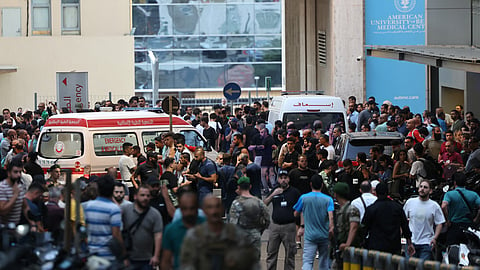

BEIRUT: A string of deadly pager explosions targeting devices owned by Hezbollah operatives have led to at least nine deaths and over 2800 people injured in Lebanon and Syria, on Tuesday, reported AFP.
The sons of Hezbollah lawmakers Ali Ammar was among the dead, a source close to the group told AFP, requesting anonymity to discuss sensitive matters.
The blasts "killed nine people, including a girl", minister Firass Abiad said in a casualty update.
"About 2,800 people were injured, about 200 of them critically" with injuries mostly reported to the face, hands and stomach, he added.
The 10-year-old daughter of a Hezbollah member was killed in east Lebanon's Bekaa Valley when his pager exploded, her family and a source close to the group said.
Iran's ambassador to Beirut was also wounded in a pager explosion but his injuries were not serious, state media reported.
In neighbouring Syria, 14 people were wounded "after pagers used by Hezbollah exploded," Britain-based war monitor, the Syrian Observatory for Human Rights said.
Hezbollah- an ally of Hamas, said "Israel is fully responsible" for the pager attacks.
Israel's involvement:
Lebanon's foreign ministry has called the blasts an "Israeli cyber attack, though the Israeli government has issued no official statement yet.
Lebanon's information minister has also termed the attack as an “assault” on Lebanon's sovereignty.
The blasts took place right after an Israeli statement on foiling a Hezbollah attempt to kill a senior official.
Lebanon's Hezbollah has stated that they will retaliate with a “fair punishment” for what they view as an Israeli aggression against them.
The United States of America, an ally of Israel, stated that they were not aware of the attacks and not involved, reported AFP.
How did it happen:
On Tuesday, hundreds of handheld pagers exploded near simultaneously across Lebanon and in parts of Syria.
A Hezbollah official who spoke on condition of anonymity told The Associated Press that “several hundred” people, including members of the group, were wounded in different parts of Lebanon when their handheld pagers exploded.
He said a few Hezbollah fighters were also wounded in Syria when the pagers they were carrying exploded, and said it was believed to be an Israeli attack.
Iran’s semi-official Fars news agency, close to the country’s powerful Revolutionary Guard, said on its Telegram channel that Mojtaba Amani, Iran’s ambassador in Lebanon, has a superficial injury and is under observation at a hospital.
Photos and videos from Beirut’s southern suburbs circulating on social media and in local media showed people lying on the pavement with wounds on their hands or near their pants pockets.
Hezbollah leader Hassan Nasrallah previously warned the group’s members not to carry cellphones, saying that they could be used by Israel to track their movements and to carry out targeted strikes.
Lebanon’s Health Ministry called on all hospitals to be on alert to take in emergency patients and for people who own pagers to get away from them. It also asked health workers to avoid using wireless devices.
AP photographers at area hospitals said the emergency rooms were overloaded with patients, many of them with injuries to their limbs, some in serious condition.
The state-run National News Agency said hospitals in southern Lebanon, the eastern Bekaa Valley and Beirut’s southern suburbs — all areas where Hezbollah has a strong presence — had called on people to donate blood of all types.
The news agency reported that in Beirut’s southern suburbs and other areas “the handheld pagers system was detonated using advanced technology, and dozens of injuries were reported.”
The Hezbollah official who spoke on condition of anonymity because he was not authorized to speak to the media said the explosions were the result of “a security operation that targeted the devices.”
“The enemy (Israel) stands behind this security incident,” the official said, without elaborating. He added that the new pagers that Hezbollah members were carrying had lithium batteries that apparently exploded.
Lithium batteries, when overheated, can smoke, melt and even catch on fire. Rechargeable lithium batteries are used in consumer products ranging from cellphones and laptops to electric cars. Lithium battery fires can burn up to 590 C (1,100 F).
The incident comes at a time of heightened tensions between Lebanon and Israel. The Lebanese militant group Hezbollah and Israeli forces have been clashing near-daily for more than 11 months against the backdrop of war between Israel and Hezbollah ally Hamas in Gaza.
Israeli supply chain infiltration likely behind Hezbollah pager blasts: analysts
Israel has scored a major intelligence success by apparently infiltrating a supply chain to cause the simultaneous explosion of hundreds of Hezbollah pagers in a blow for the Lebanese militant group and its Iranian backers, analysts say.
With Hezbollah appearing to prefer the use of pagers for internal communications over smartphones for security reasons, analysts said it appeared Israel had corrupted the devices before delivery, allowing them to explode at a specific time.
A source close to Hezbollah, asking not to be identified, told AFP that "the pagers that exploded concern a shipment recently imported by Hezbollah of 1,000 devices", which appear to have been "sabotaged at source".
"For Israel to embed an explosive trigger within the new batch of pagers, they would have likely needed access to the supply chain of these devices," said Brussels-based military and security analyst Elijah Magnier.
"Israeli intelligence has infiltrated the production process, adding an explosive component and remote triggering mechanism into the pagers without raising suspicion," he said, raising the prospect the third party which sold the devices could have been an "intelligence front" set up by Israel for the purpose.
Charles Lister of the Middle East Institute said: "This was more than lithium batteries being forced into override. A small plastic explosive was almost certainly concealed alongside the battery, for remote detonation via a call or page."
"Mossad infiltrated the supply chain," he concluded, referring to Israel's intelligence agency.